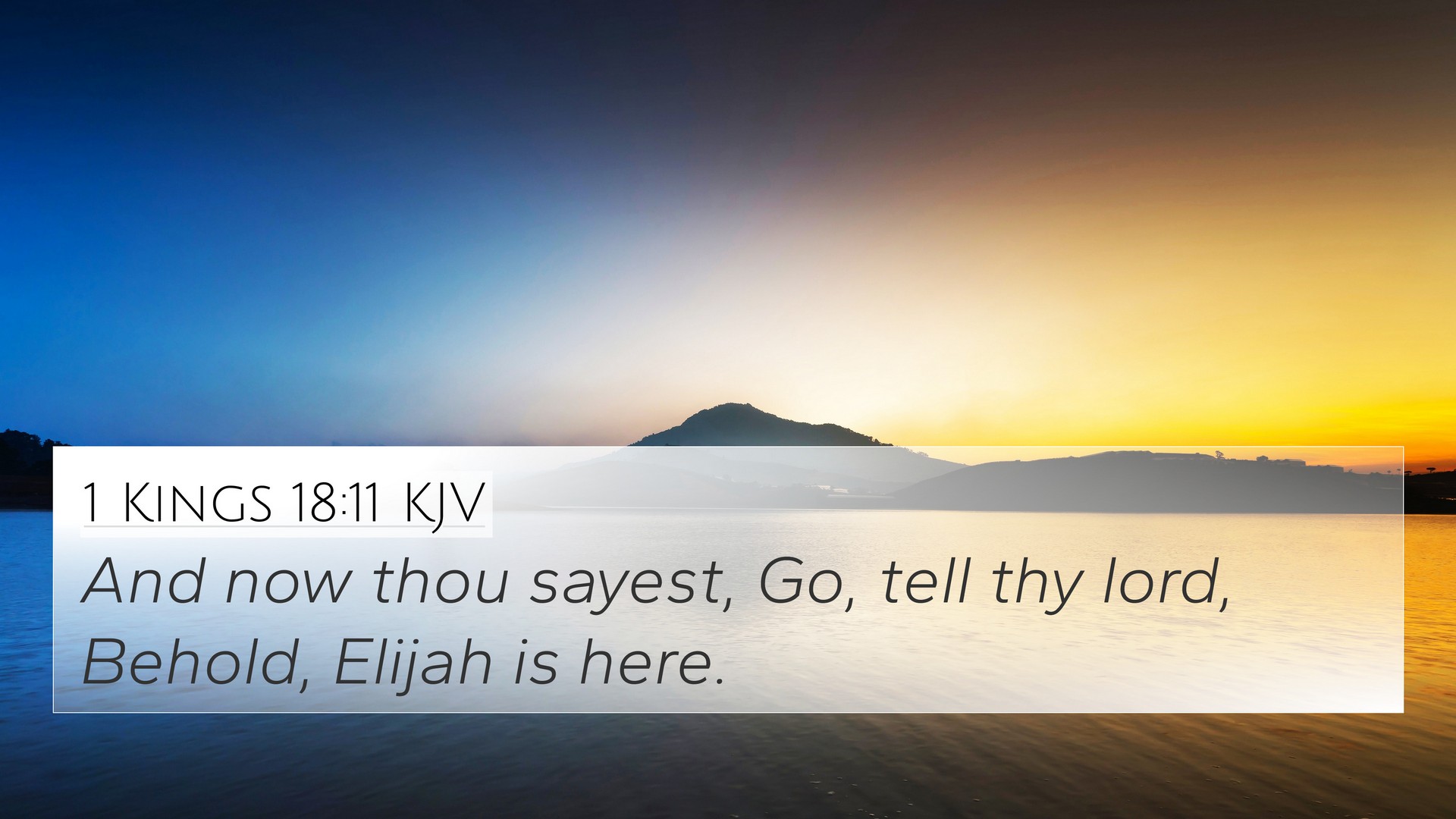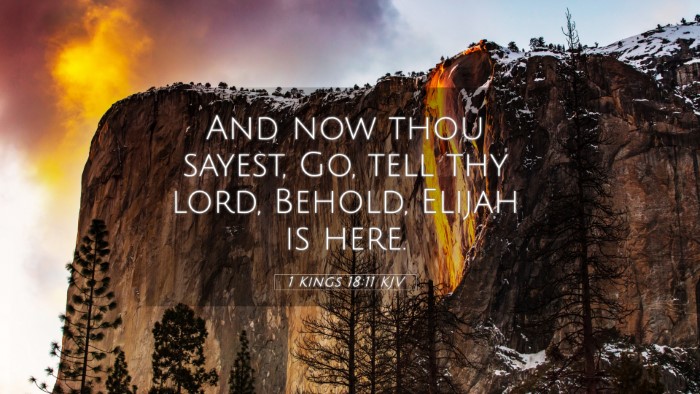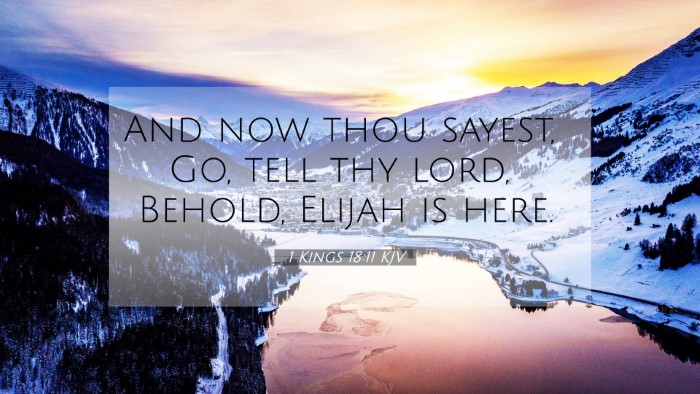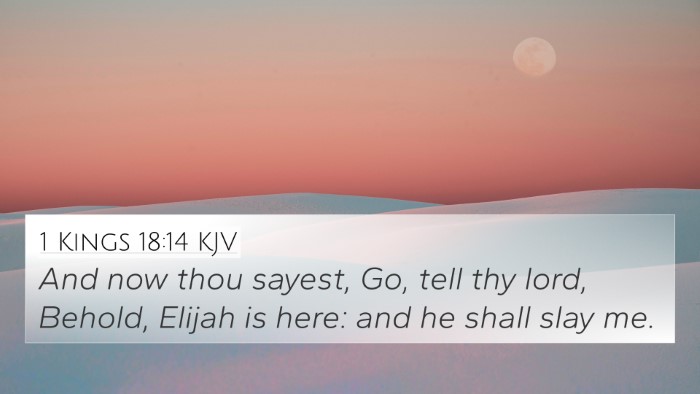Understanding 1 Kings 18:11
The verse 1 Kings 18:11 states:
"And now you say, ‘Go, tell your lord, “Behold, Elijah is here.”’"
This verse occurs in a pivotal moment during the confrontation between the prophet Elijah and the prophets of Baal on Mount Carmel. It involves Obadiah, a faithful servant of King Ahab, who secretly preserved the lives of God's prophets. Here, Elijah is about to reveal himself to King Ahab after a prolonged drought and demonstrate God's power over Baal.
Contextual Background
To fully understand this verse, one must consider the historical and theological context:
- The Spiritual Climate: Israel is steeped in idolatry under Ahab and Jezebel's reign, with the worship of Yahweh heavily suppressed.
- Elijah's Role: Elijah is called to restore worship of the true God and demonstrate His authority in a world that has turned to false gods.
Commentary Insights
Drawing insights from key public domain commentaries:
-
Matthew Henry:
Henry highlights God's providence in guiding Elijah to confront Ahab, showing that the divine purpose prevails even amid human opposition and treachery. Obadiah’s hesitance emphasizes the danger of following God's instructions in a corrupt environment.
-
Albert Barnes:
Barnes delves into the significance of this encounter, explaining that Obadiah’s fear reflects the gravity of challenging a ruler who has actively sought to suppress the prophets of God. Elijah's declaration is an assertion of divine sovereignty and authority.
-
Adam Clarke:
Clarke points out that this moment illustrates the contrast between earthly authority and divine mission, emphasizing the faith required for Obadiah to obey Elijah’s command despite the risks involved.
Bible Verse Connections
1 Kings 18:11 can be cross-referenced with several other verses that highlight themes of faith, divine intervention, and the struggle between true worship and idolatry:
- 1 Kings 17:1 - Elijah's prophecy of drought as a consequence of Israel's sin.
- 1 Kings 18:20-21 - The challenge to the prophets of Baal to prove whose god is real.
- 2 Kings 2:1 - Elijah's translation and the continuation of his ministry through Elisha.
- James 5:17-18 - The New Testament reference to Elijah’s prayer for rain, emphasizing the power of prayer.
- 1 Samuel 15:22 - The importance of obedience over sacrifice in the context of divine service.
- Romans 11:4 - God's preservation of a remnant of faithful believers, akin to God's prophets hidden by Obadiah.
- Luke 4:25-26 - Jesus references Elijah’s ministry during a time of apostasy and his mission to the Gentiles.
Thematic Connections
This verse and its context exhibit several themes prevalent throughout Scripture, including:
- Divine Authority: The eternal conflict between God's authority and that of earthly rulers.
- Faith in Adversity: The courage exhibited by Elijah and Obadiah amidst spiritual and political turmoil.
- The Necessity of True Worship: A recurring theme throughout both Testaments, where God demands undivided loyalty.
Practical Application
For believers today, 1 Kings 18:11 serves as a reminder of:
- Courage to stand firm in one's faith despite societal pressures.
- Faithfulness in obeying God's call, even when circumstances seem perilous.
- God's Sovereignty in guiding His servants, demonstrating that He will make a way even in difficult situations.
Conclusion
In summary, 1 Kings 18:11 encapsulates a moment of significant prophetic authority and divine intervention within Israel's history. Through cross-referencing this verse with others, we uncover rich themes that connect the Old and New Testaments, illuminating God's unchanging nature and the call for true worship amidst a world rife with distractions. For those engaged in a serious study of the Bible, employing tools for cross-referencing like concordances and Bible reference resources can greatly enhance one’s understanding and lead to a deeper appreciation of Scripture.
As you explore the connections between Bible verses, consider the implications of how verses like 1 Kings 18:11 provide insight into the ongoing dialogue between divine power and human responsibility, displaying God's relentless pursuit of His people.




